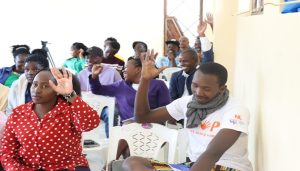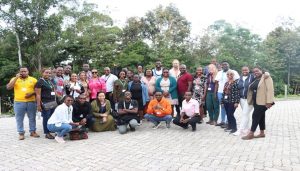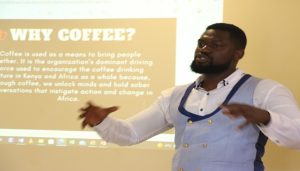Intersectionality in Action: Youth-Led Change by BCN in Nakuru
 02 August 2024
02 August 2024
A healthy thicket shrouds a narrow road winding up a hill and at whose end, one of the gates to the Nakuru GK prison stands stoic and unrelenting. A number of uniformed and armed officers’ man the gate, effecting all security protocols before anyone is let in. Odd choice of venue, one would think – and this even comes up later, in the day’s discussions.
In one of the modern facilities at the St Paul’s Pentecostal Church (Kingdom Seekers) situated within the Nakuru GK Prison precincts, the stage is set – two separate rooms where the Black Coffee Network (BCN), will carry out different activities for the day, concurrently.
Youth drawn from various wards in Nakuru West Sub-County including London, Shaabab, Kapkures, Rhonda and Barut – budget champions trained by BCN – gather for a capacity building training in one of the rooms and in the other, a delegation drawn from various CSO’s across Africa in the company of Make Way Officials and members from the Dutch Embassy in Kenya attend a linking and learning activity that is also facilitated by BCN in Partnership with The Circle for Concerned African Theologians.

A section of Budget Champions undergoing further Training by BCN
About BCN
To the delegation that arrives at around 1000hrs, Chris Matagaro, the Director at BCN introduces the organization as a Pan -African Youth Network registered in Nakuru County, as a Community-Based Organization comprising members between the ages of 16 and 29 who come together bi-monthly under a forum dubbed the BCN Lounge to deliberate on meaningful youth-related issues.

The delegation poses for a photo at the end of the linking and learning activity
Besides being a beacon of budget advocacy in Nakuru to ensure appropriate allocation of funds and resources for SRHR priorities in the county, BCN has been focal in providing comprehensive sexuality education to young people particularly youth with compounded vulnerabilities. An endeavor which Chris cites, helps, “young people to acquire knowledge and make informed decisions.”
Chris informs further that BCN is at the forefront of implementing budget advocacy, carrying out social media campaigns to drive awareness and sensitization on intersectionality, hosting webinars such as ‘Youth, Religion and Sex Talk as well as implementing the Intersectional, See, Judge Act (ISJA) tool, a product of The Circle.
Intersectionality, Social Accountability and SRHR
“One interesting thing about the Intersectional See Judge Act tool is that we use the Bible for advocacy. We use religious texts to do advocacy. I have practically engaged with religious leaders on matters SRHR and whenever we engage with them, for instance, the issues of sin come in, the issue of purity, the issues of society come in. So what ISJA does is one thing that is called communal reading…” Chris Matagaro explained.
“We use a piece of biblical text, and then we use a piece of current text that is happening right now. You could use maybe from a local newspaper, radio station anything that has happened in your community and we read through both the religious text and the contemporary text, and we review it together including the religious leaders and the community and based on that tool we have realized that whatever is happening in the Bible is literally happening in the society right now. So that means, the bible can be used to advocate for SRHR. The bible can be used to advocate for issues of rape, GBV and the likes…” averred Chris adding that, “what this tool does is first demystify the myths that the Bible cannot accommodate issues that are reproductive health and rights based.”
He further explained that the tool facilitates conversations with religious leaders on how to make the church a safe space for young people. “We are reminding religious leaders that the church is the safest of safe spaces that exist,” he said. “How do we enhance that? How do we ensure that a pregnant teenage girl does not get afraid to go to church to seek help,” he posed, questioning the narratives that envelop such occurrences with overtones, sometimes of immorality and fornication.
Chris further pointed out that, “as we are looking at multigenerational and intersectional interventions, we try to address these issues with religious leaders and the community,” noting that the tool “brings back the idea of religious institutions being at the forefront of addressing societal issues.”

Chris Matagaro, the Director at BCN, facilitating the event.
Speaking at the event, Emmanuel Baarare, a Make Way Youth Panel member who also co-facilitated at the event observed that, “it’s interesting to know that religion can be used to embrace rather than chase.”
Baarare dissected the overlap between the concepts of intersectionality, Social Accountability and Sexual Reproductive Health and Rights, tenets that the Make Way program embodies to the core. He described intersectionality as, “an analysis of how various identities of a person combine to create different modes of marginalization or privilege while accessing SRHR related services, depending on their context,” and social accountability as “the deliberate conscientization of marginalized youth on their rights to hold public officials to account for the provision of SRHR related services.”
He, moreover, stressed on the importance of youth participation in resource allocation decision-making, such as participatory budgeting and planning noting that it is, “very very important.”
“We may not be aware of ways in which we can be socially accountable with ourselves and with our leaders and therefore, we appreciate this opportunity to learn on one of these social accountability tools,” he added.
Peter Mutua, representative for Youth for Sustainable Development (YSD) in Makueni also elaborated on another social accountability tool, the Intersectional Community Scorecard (ICSC) which he informed was intended to, “enable marginalized youth to voice their assessment of SRHR related services in their communities.”
Chris highlights the achievements of BCN to include the formation of Nakuru County’s SRHR Working Group, Strengthening Peer to Peer learning and mentorship, consulting and facilitating trainings in the county and beyond, training and capacity building of budget champions, public participation in County and in National Policymaking fora.
He further elaborates the different methods that BCN employs to engage the youth including modelling and ‘Artivism’ which he explains as, “where you use art to do advocacy.” He exhibits a number of art pieces that speak to a myriad of issues that bedevil society today including issues such as GBV, Oppression,
“As organizations, we need to think through what avenues and processes we can use to advocate for what we do…young people have such incredible ideas that we can use to alleviate societal issues. Things to do with Gender Based Violence, silencing women…” he cajoles.
“We love to break the barriers, think outside the box. Try to do something different as opposed to the way things have been done before,”
In summary, BCN is a true testament to the efforts of the Make Way project. The organization plays a pivotal role in implementation of program activities which in turn enhances accessibility of SRHR services and information for all. Through the Black Coffee Network, many youths in Nakuru County and beyond are able to not only access services and information but also realize their rights, articulate their issues and what is more, be part of a community of likeminded individuals where they are trained, equipped with skills as well as embraced holistically in a way that encourages them to express themselves, their ideas and their talents.



